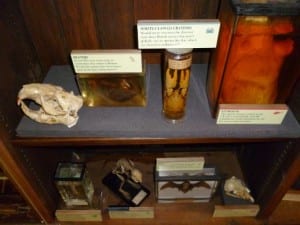Really rare? Making British decisions in conservation
By Jack Ashby, on 12 December 2011
 Should species like red squirrels be protected in England when they are common in Europe?
Should species like red squirrels be protected in England when they are common in Europe?
This is the newest question we are asking in our QRator iPad displays.
There is a limited amount of money available for conservation. Not everything can be protected. How important is it if an animal goes extinct in one country if they still exist elsewhere? Some species, like red squirrels are common in Europe but declining in the UK – should they be protected here? Do local extinctions affect global biodiversity?
The specimens we have chosen to represent this question tell these stories:
RED SQUIRREL
Despite populations being of no concern globally, these rodents are threatened in the UK and they receive an intense conservation effort.
BATS
All bats have extremely high levels of legal protection in Britain, but some of these species are common in other parts of their ranges.
WHITE-CLAWED CRAYFISH
Should more resources be diverted away from British species that aren’t globally rare to species like this, which are classed as endangered?
GREAT CRESTED NEWT
This amphibian is considered a conservation priority in some of its native countries, including Britain, but it is of least concern globally.
GOLDEN EAGLE
This species was probably never common in the UK; despite being widespread across much of the Northern Hemisphere, it is protected here.
BEAVERS
It cost £2m over seven years to reintroduce this rodent to Britain. Would this money have been better spent protecting existing species?
STURGEON
This species became extinct in the UK and is now globally critically endangered. Local extinctions are the first step to total extinction.
Do let us know what you think by getting involved in the conversation on the QRator project website.
2 Responses to “Really rare? Making British decisions in conservation”
- 1
-
2
download recovery software for windows 7 wrote on 6 November 2018:
A fascinating discussion is definitely worth comment. I think that you ought to write more on this subject, it may not
be a taboo matter but typically folks don’t discuss these subjects.
To the next! Best wishes!!
 Close
Close


Regards uk rare speces that are common in europe. I don’t believe in many cases it’s as simple as assuming the species are the same value. The uk populations may be genetically distinct from those of Europe and therefore there maybe a greater need to protect these populations (or not). Looking at the case of the Tasmanian devil and the bottle neck that has enabled the spread of facial tumors, it maybe time to re address species in terms of genetic diversity and variance as well as rarity. In this context small isolated populations maybe more important then realised, but if not then indeed efforts could be better used and funded elsewhere.